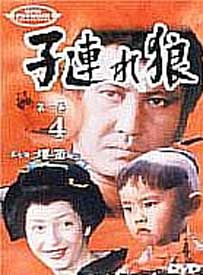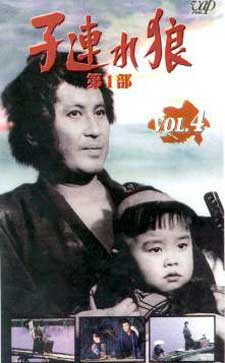Lone Wolf & Cub 1:13: No Betrayal tells two interwoven stories, one about Ogami Itto as a moral avenger, the other about his three year old son Daigoro. Daigoro's portion makes this one of the strongest episodes in the series because of the extraordinary heroism & moral comprehension revealed in him. The twin adventures are unified by the theme of fidelity or unwillingness to betray, as the father, so the son.
A villainous silk merchant hired robbers to break into the homes of rival silk merchants & kill entire families. Osae, a young woman, is the only survivor of the third break-in.
A Buddhist priest pays Itto to be her yojimbo (bodyguard). Itto begins at once to set things in motion that will result in own opportunity to put an end to the bad merchant's infamy, but he explains himself to no one. His machinations cause the priest & Osae to wonder if Itto is going to betray them, but the priest counsels Osae to have faith in Itto, for once an assassin has accepted payment, he will never fail in his commission.
 An honest but stern magistrate from Edo is meanwhile searching the village for a notorious female pickpocket known as "Seven Spectre Oyo." Daigoro wanders off from the temple while his father's away, attracted to the sound of a festival. The Edo pickpocket is nearly caught. Quick to rid herself of the wallet she has just stolen, she passes it to Daigoro, giving him a coin as reward & instructing him not to reveal where he got the wallet. An honest but stern magistrate from Edo is meanwhile searching the village for a notorious female pickpocket known as "Seven Spectre Oyo." Daigoro wanders off from the temple while his father's away, attracted to the sound of a festival. The Edo pickpocket is nearly caught. Quick to rid herself of the wallet she has just stolen, she passes it to Daigoro, giving him a coin as reward & instructing him not to reveal where he got the wallet.
Daigoro is stripped naked in public, tied face down, & severely whiped for not revealing who gave him the wallet. Oyo observes the little boy's stoicism, refusing to cry or call out or reveal any suffering as he receives thirty lashes. Ogami Itto is also in the crowd, but does not intervene.
Oyo is deeply moved by Daigoro's refusal to betray her, & runs forth to stop the beating, swearing to change her life for the better because of the strength of this child. Daigoro afterward rejoins his father, who silently approves of his son's behavior.
The magistrate who had beaten the child suddenly realizes who Daigoro must be. The magistrate speaks the ultimate moral of this episode: "Lone Wolf & Child are something else!" By gum they certainly are.
The first season's fourteenth episode is North to South, East to West. A child named Kotaro is arrested along with his father. They're to be transported to Edo. There the boy is to be tortured until his father, Wakai, reveals the clan secret of a hidden gold mine. The arresting magistrate says, "I've never yet met any father who would forsake his son."
Ogami Itto, the assassin with child, is hired to kill Wakai, who is a brave & noble clansman, but nevertheless apt to speak when his son is tortured. The clan will be abolished if its secrets are known, so Itto agrees to kill an essentially good man.
Itto fights his way into the well-guarded bailiff's office to kill Wakai, but the Edo official will kill Kotaro if Itto completes his task. So Itto backs off, intending to first save the child.
Kurokowa, a yojimbo (samurai bodyguard) living among mountain bandits, is sought by Kotaro's mother Shizu. She & Kurokowa were childhood friends & sweethearts. He does not appreciate her request that he save her husband from the assassin. But for love of her, he risks his life, to small avail.
It's an unusual episode in that Itto for once comes to the conclusion that it is necessary to kill the man he was hired to kill, since Itto has instead negated the necessity for him to die. Having gotten Kotaro to safety, it is no longer at all likely Wakai will ever speak in any way that will harm the clan, but will commit suicide for his son's sake. A fine tale well played!
The lone wolf Ogami Itto & his three year old son Daigoro meet an herbalist training to be a doctor, in episode fifteen Night of the Fangs. When the herbalist learns that Itto is an assassin for hire who takes his son with him into horrific dangers, he says to Itto, "As a human being & as a father you are evil!"
These episodes are to be savored & not viewed too many at one time. They can too often seem to boil down to "Itto kills a bazillian Yagyu spies & sundry bad guys while the innocent face of Daigoro gazes on." But viewed at intervals, each tale is like a well chosen wine, each like & unlike another wine chosen for another day. That this one acknowledges in so many words that Itto is less than an ideal father (however admirable those of us among his fans may find him) is a distinction that sets this episode apart.
Itto is hired to assassinate an assassin, for the sake of a clan striving to protect itself from being abolished by the shogun. When the herb doctor turns out to himself be a Yagyu spy, he'll admit somewhat sheepishly, "I tried to kill you, it's true. But what I said about your son I really felt."
In the wake of carnage, Ogami Itto pushes the babycart toward the next adventure. The narrator (who attempts an ironic final statement at the end of each episode) observes, "Their destiny never changes."
Ogami Itto & Daigoro are brought by their "road to hell" to a place Itto has not seen since before Daigoro was born. Here alongside the river Itto, when still the shogunate's official decapitator, attended a seppuku ceremony of a daimyo's ritual belly-slitting, serving as "second."
At the riverside is a ronin fishing. He is attacked by local clansmen, who don't have a chance against him. Itto realizes this man is Makabe Shogen, an important witness to the ritualized suicide & Itto's decapitation of the lord those few years before, when all their fortunes differed.
That daimyo's last wish was to witness Itto's famous swordsmanship. His unstated hope is that Makabe Shogen can kill Itto as a last-minute act of rebellion against the shogunate. But Makabe wants foremost to protect the dignity of his lord's death. Though he has his moment in the duel when he might indeed have killed Itto, he holds back, & Itto gazes askance at his opponent with veiled surprise.
Makabe is afterward shunned by his fellow retainers who deplore that he did not take advantage of his opportunity. For the next few years, he protects the sanctity of a riverside cairn he built to memorialize his lord. And when Itto arrives, both men know it was fated that they complete their duel, this time to the death.
Vassals of the region's new clan despise the proud scruffy Makabe & by attacking him get several of their numbers killed. The clan's manager cannot stand by as one ronin induces retainers to look incompetent or get themselves killed. He hires Itto to kill the powerful ronin, but for the first time Itto refuses to take payment for a job he'll likely do anyway. "Call it a grudge," is his only explanation, but we know he wants a rematch with the only opponent who ever came close to defeating him.
Itto is willing to delay the encounter until Makabe can complete a woodcarving of a boddhisatva for his lord's shrine. In the meantime, Daigoro has some lovely scenes when he is captured, tied up, called "not a human child, but a wolf cub."
The ease by which the three-year-old escapes is winningly funny. But the real beauty of it is he quickly returns with medicine for his sickly captor, a wandering shamisen player. Daigoro nurses her as he has done in the past for his dad.
In one critical encounter, Itto tosses Daigoro as a veritable weapon against a foe, & for the first time we see Daigoro weep. The final duel between Makabe & Itto is engaged in the river, wherein Itto can use his "hidden sword" stance with sword held under water.
It's a pleasant episode with more originality than most. Fine characterizations are woven throughout.
copyright © by Paghat the Ratgirl
|

